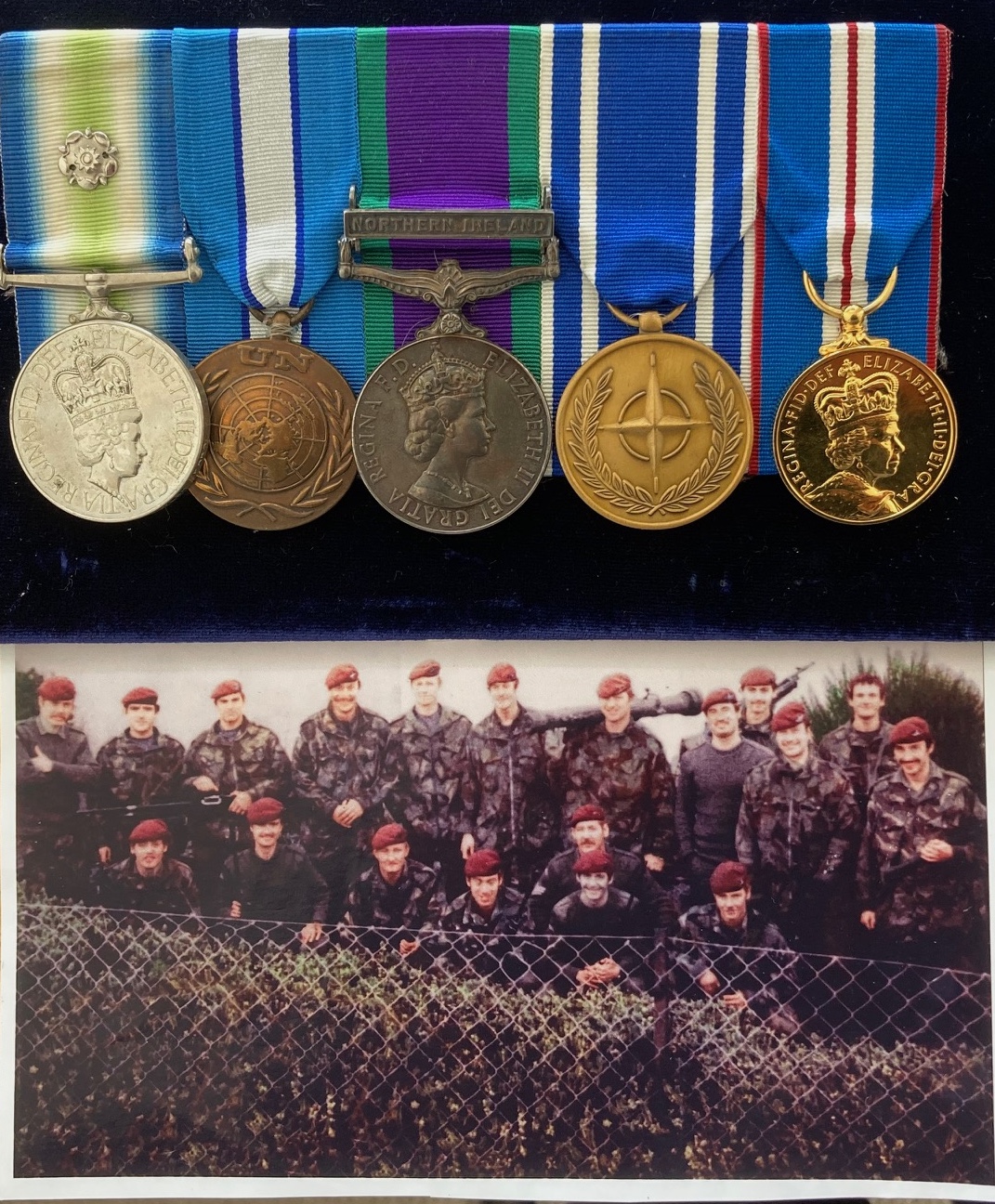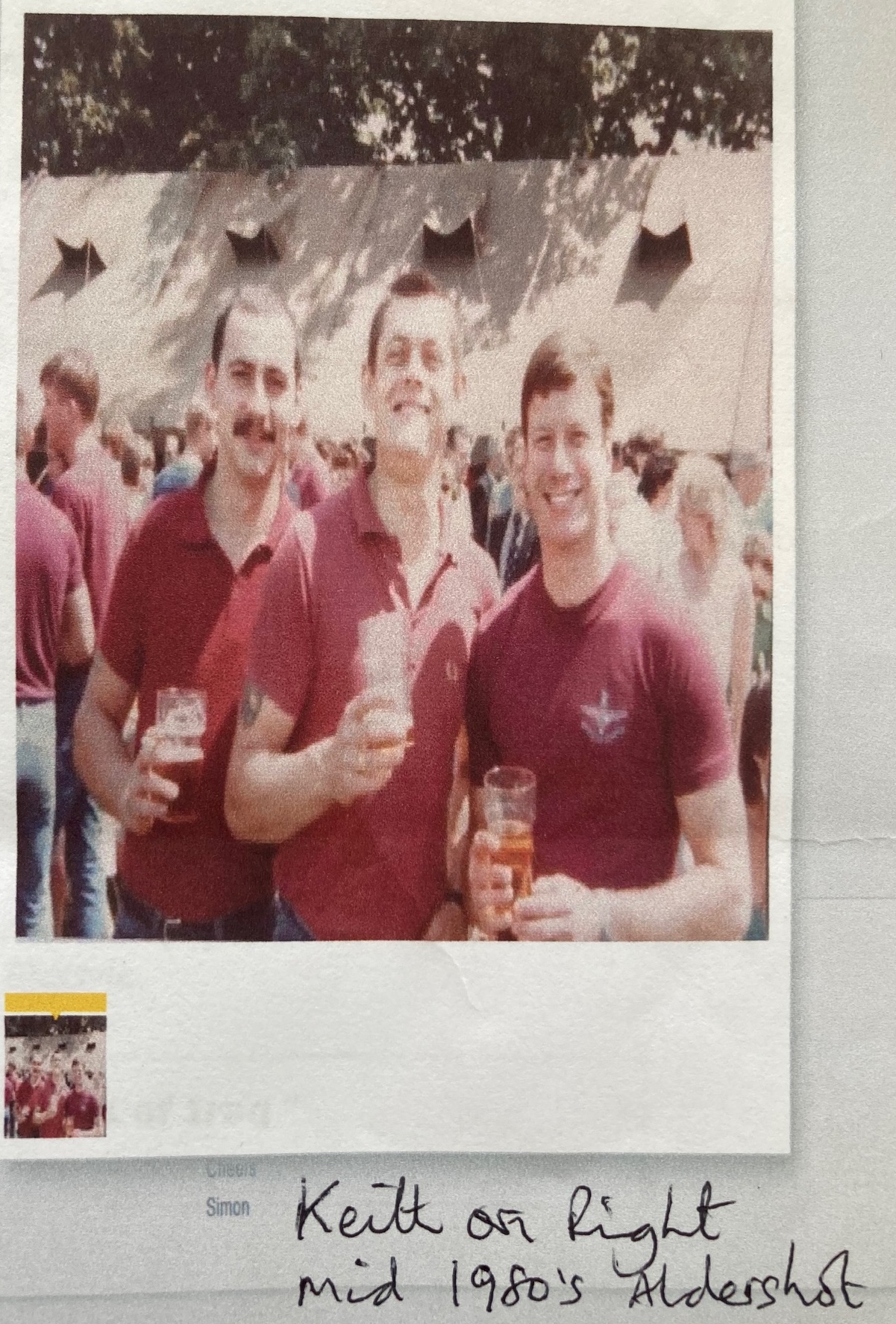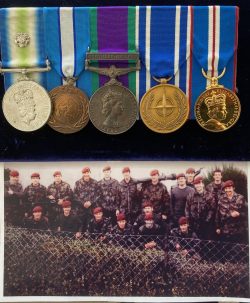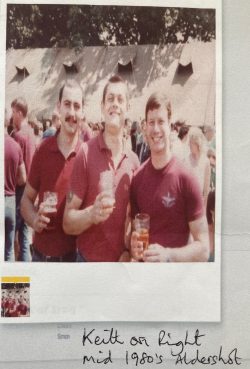South Atlantic group of 5 Parachute Reg. served A Coy. 3 Para later Col. Sgt. and following private security contractor killed by a suicide car bomber in Iraq in 2004 whilst travelling in convoy as protection for overseas workers
£3,800.00
Out of stock
South Atlantic with Rosette (Pte. Para) ,UN Cyprus,, C.S.M. clasp Northern Ireland ( (L.Cpl. Para.), U.N. Medal, 2002 Jubilee
K.T. Butler, Para
With photographic image and copy Cin C Commendation Certificate for the rescue of an unconscious driver and passenger of a burning car, aldershot 1983, and copy newspaper extracts concerning concerning the suicide bombing. Also a letter from his widow detailing Butler’s career
Joined 1981 to 2 Para 1998, left 2003. as Colour Sergeant
The Guardian
Press Association
Tue 15 Jun 2004 10.32 BST
‘One of two Britons killed by a car bomb in Baghdad was a former paratrooper who fought in the Falklands and completed tours of duty in Northern Ireland, it was confirmed today.
Keith Butler, 46, a former sergeant, died with his colleague, a man believed to be from London, yesterday while working as security guards for three foreign workers involved in the reconstruction of the Iraqi electricity industry.
The Foreign Office confirmed that Mr Butler’s next of kin have been informed of his death, but could not confirm the identity of the second dead Briton.
Both men were working for Olive Security, a London-based firm that employs former members of the UK special forces and has around 300 members of staff in Iraq.
The two Britons were among 13 people who died when a convoy of three 4×4 vehicles was blown up close to Tahir Square, in central Baghdad, at around 8.30am yesterday morning.
The blast was reported to have destroyed eight vehicles and reduced nearby shops and a two-storey house to rubble.
An Iraq interior ministry official confirmed 13 people were killed in the blast, including the two Britons, one American, one Frenchman and one Filipino.
Three of the dead were employees of Granite Services, a Florida-based subsidiary of General Electric, and were under the protection of British security staff.
US officials believe that a further 62 people were injured, including 10 foreign contractors, and hospital officials said many of the wounded had lost limbs.
A spokesman for Olive Security said the company “regrets to confirm the death of two of its consultants who were killed in Baghdad on June 14. Both individuals were British nationals providing security for personnel and assets involved in the valuable rehabilitation of the power infrastructure in Iraq.”
In March, a third Olive Security employee, former Colour Sergeant Chris McDonald, died performing security for foreign engineers working at a power station east of Mosul.
Witnesses said that, moments after yesterday’s car bomb exploded in the capital, young men raced into the street, hurling stones at the flaming wreckage, looting personal belongings of the victims and chanting slogans against the occupation.
The crowd poured kerosene into one of the vehicles and set it on fire, while around 20 youths danced around a charred body.’
Served with Major Collet’s A Company, 1 Platoon, in the Falklands
The services of A Company are best encapsulated in Major Collett’s Military Cross citation (one of only 2 to 3 Para)
Military Cross : Major Collett commanded A Company 3rd Battalion The Parachute Regiment throughout the Falklands Islands campaign. After a long and arduous advance towards the Brigade’s major objectives, his company was deployed well forward of the battalion’s main position, in ground dominated by enemy-held features. For five days, his Company endured repeated attention from enemy indirect fire, but his position as a forward patrol base was too valuable to surrender. His calmness and leadership during this difficult period was exemplary, and his skill insiting of his position to take maximum advantage of a reverse slope was crucial in reducing casualties to a minimum. During the same period, active recce patrolling and one fighting patrol mounted by his Company all provided information invaluable in the final assault on the battalion’s major objective.
For the next attack, Major Collett’s Company was tasked to capture the ridge running North West from Mount Longdon. After a swift and tactically skilful advance, he led his company along a shallow valley known from previous patrols to be an enemy fire target for both machine guns and artillery, in order to achieve maximum surprise on his objective. His movement thus remained undetected until he was close to the crest of the ridge line, at which time his Company came under sustained and accurate fire from machine guns and snipers from the mountain several hundred feet above him. Several casualties were sustained from this and mortar fire, but he secured his position and drove off an enemy standing patrol nearby. After maintaining his position for several hours under extremely unpleasant conditions, during which time his Company provided highly effective fire support to B Company which was advancing along the mountain on their right flank, Major Collett was ordered to move up the shoulder of Mount Longdon and to pass through B Company to secure the Eastern pinnacles and forward slopes of the mountain. By this time his Company were very tired, but he rallied them brilliantly. Moving up the steep, rocky slopes of the mountain under continual harrassing small arms and indirect fire, he linked up with B Company on the high ground and issued orders to his platoon commanders for their attack. Narrow as the objective was, he was forced to attack with one platoon forward at a time, against heavy small arms fire. The enemy were also using direct fire missiles and mortars, but led by their Company Commander, his platoons successfully fought forward and as dawn began to break it was clear that at last the highest ground was ours. For the next three days, Major Collett’s Company maintained their vital hold on this objective, subjected to extremely heavy, accurate, and observed artillery and mortar fire from the East.
The performance of A Company throughout the operation against Mount Longdon and after its capture was outstanding, and reflected the fine and courageous leadership of their Company Commander. Always to the fore, his example of calmness and tactical good sense was an inspiration to all.
